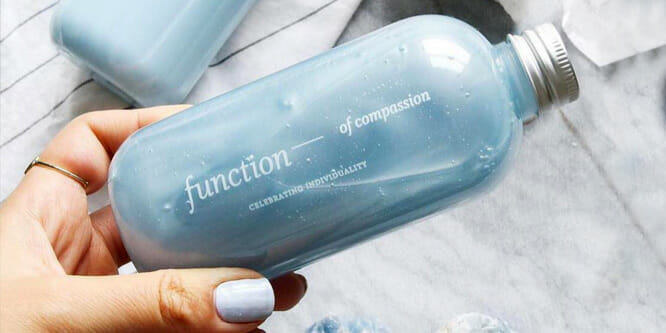
Photo: Function of Beauty
New-gen D2C brands get more personal with consumers
Since 2015, Dirty Lemon Beverages has been selling its trendy, “active” beverages direct-to-consumer (D2C) solely via text message. In a session at Shoptalk, the company’s CEO, Zak Normandin, explained the ordering model and discussed the brand’s plans for expanding the use of its platform to target new markets.
“You come to our website — the only differentiator is that we verify your phone number,” said Mr. Normandin. “Once you place your first order, the only thing you have do is send us a text.”
Dirty Lemon’s order processing system is AI-based, but pushes conversations to a real person if the text inquiry is outside of the logic of the AI. No app is required to utilize the service.
With more than 100,000 regularly-purchasing customers and a 60 percent retention rate month-over-month, Dirty Lemon Beverages now intends to expand, inspired on some level by Coca-Cola’s moves beyond soda. Dirty Lemon has acquired the “Juice Served Here” fruit beverage company and will begin making its products available via the text message platform. The brand also plans to move into low-alcohol beverages and sparkling water.
Also speaking in the session were Zahir Dossa, CEO of Function of Beauty, a hyper-personalized D2C shampoo and conditioner company, and Pradeep Elankumaran, co-founder of Farmstead, a D2C grocer.
Mr. Dossa explained that Function of Beauty invites users to fill out an online questionnaire about their hair type, goals, preferred color and characteristics of fragrance. An algorithm then determines the correct ingredients to create a hyper-personalized shampoo and conditioner, which a machine mixes to the spec, and even includes the customer’s name on the label.
The company has also opened a showroom in New York, which allows visitors to see their product being created with the company’s proprietary machinery.
Mr. Dossa believes the D2C model is a critical characteristic of the brand, thinking that making product available on a retailer’s shelves would be a betrayal of the company’s one-on-one relationship with the customer.
“Were we to work with Sephora or whoever it may be then suddenly we’d just look like every other shampoo and conditioner company out there; we’d lose that special sauce,” he said.
Discussion Questions
DISCUSSION QUESTIONS: What can other brands going D2C or considering it learn from Dirty Lemon Beverages and Function of Beauty? Do you see Function of Beauty’s refusal to consider working with retailers a reasonable position? How might retailers contend with such a mindset?
